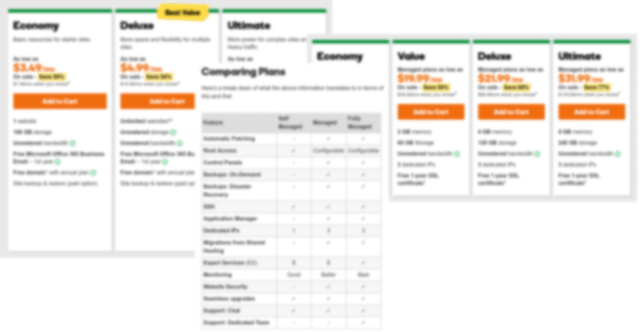So, you want a WordPress website and someone says “What kind of hosting are you going to get?”
Hosting you say? What’s that?
“Well, if you’re going to have a WordPress website, you want the best Hosting for WordPress you can find, right?”
And thus begins a long weekend of research. After a while, your eyes cross and all you can see are things like this...

There are so many types of hosting! They’re all great, but definitely not one-size-fits-all.
Which is the best Hosting for WordPress plan for YOU?
In the rest of this article I’m going to do my best to save you a long weekend of looking at charts and options until your eyes blur. Our Hosting for WordPress comparison is going to look at three different types of hosting:
- Shared
- VPS (Virtual Private Server)
- Managed Hosting for WordPress
Shared hosting
Shared hosting is the cheapest form of hosting and best for any site with a low traffic volume. This could be a personal journal, a book club log, or anything else that doesn’t stress the server until the project starts to gain traction.
Here’s how it works: The hosting provider sets up multiple customers on a single server. The customers all share the resources of the machine, like hard drive space, memory, and CPU. This is wonderful for some needs, but can be terrible for others. Let’s look at the pros and cons.
Pros
- It’s affordable. For example, GoDaddy offers an affordable shared hosting plan. Most coffee drinkers spend more than the monthly cost of this plan on coffee for one day.
- It’s easy to get started. Shared hosting is systematized, well documented, and mostly automated, e.g. with one-click WordPress installations.
- The hosting provider handles server-level performance optimization and security. Plus, when a site has outgrown a shared hosting plan, the hosts make it easy to move the site to a more appropriate hosting solution.
Cons
- Shared hosting isn’t optimized specifically for WordPress websites.
- Sharing resources with other customers means their sites’ behaviour may affect the performance of your site. This usually isn’t a problem for hobby sites or personal sites, but it is a risk for businesses and online stores.
- If your website on the server suddenly goes viral and gets millions of visitors, the performance of the entire server is affected. The site might be taken offline to protect other customers from being affected. (When that happens it’s time to move up, more on that below.)
VPS hosting
VPS stands for Virtual Private Server. VPS hosting is vaguely similar to shared hosting in that multiple customers share physical hardware, but with VPS hosting each server has dedicated, reserved resources. Your neighbor on the server can’t fill up your share of the hard drive, nor your memory nor processing power. The resources are exclusively yours.
As with every kind of hosting, VPS is perfect for some people, and terrible for others.
Anyone with a site that has outgrown shared hosting, but that’s not quite big enough to warrant its own hardware, should try VPS. Word of warning: You’ll need to be handy at configuring the server, since it’s usually a pretty plain setup.
Pros
- Value. VPS can cost much less than a dedicated server, where you have the entire machine to yourself. With VPS you can get almost the same, and sometimes actually the same power, as a dedicated machine.
- Performance. A VPS hosting plan is more powerful than shared hosting.
- Scalability. Additional resources can be allocated to a VPS account without requiring the account to be migrated. So if you suddenly find yourself in need of more memory, space, or processing power, it’s a quick fix.
Cons
- Price. A VPS plan is more expensive than shared hosting. (That said, if your business depends on a well-performing website, the investment in a VPS plan is worth it.)
- Complexity. Managing a VPS plan requires more know-how than managing a basic shared hosting plan.
- Time spent on admin tasks. This goes hand-in-hand with the previous point. With a VPS plan you have more server management responsibilities to take care of.
Managed Hosting for WordPress
In general, “Managed Hosting” means you pay someone else to take care of server management tasks for you. With Managed Hosting for WordPress you’re paying the hosting provider to take care of the server AND make it work especially well with WordPress.
This sort of optimization is good for improving the speed and security of a WordPress site, among other things.
Here are some pros and cons of Managed Hosting for WordPress:
Pros
- WordPress expertise. You don’t have to think about doing any of the server optimization yourself. There are people taking care of it for you.
- Extra WordPress features. This can include caching for faster site speed, regular backups, easy restores, one-click staging, site cloning, etc.
Cons
- Price. Managed Hosting for WordPress is a specialized service that costs more to provide and maintain than regular hosting, and prices generally reflect that.
- Restrictions. Managed WordPress users are restricted in what plugins they can install, and you can’t run other software alongside WordPress. (Managed Hosting for WordPress plans are only for WordPress sites.)
Choose the best Hosting for WordPress plan for you
Choosing the best Hosting for WordPress plan for your website can be make-or-break for your business. Choosing a plan that doesn’t support your needs can impact your sales, brand reputation, and ultimately your bottom line.
Whether you want full control over your site’s server infrastructure, are ready for someone else to do the heavy lifting for you, or somewhere in between, there’s a plan for you — you just have to find it! If you choose any annual WordPress Hosting plan from GoDaddy, you'll be also eligible for a free domain.
Editor’s note: GoDaddy’s Web Hosting Plus and Pagely's Enterprise WordPress Hosting plans combine the resources of a VPS with the convenience of a cPanel shared hosting interface. We think it’s a perfect fit for WordPress sites. Learn more about Web Hosting Plus or download our guide to cPanel + WordPress.
Also, GoDaddy offers discount codes for you to save money on Hosting for WordPress.










